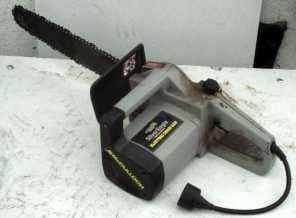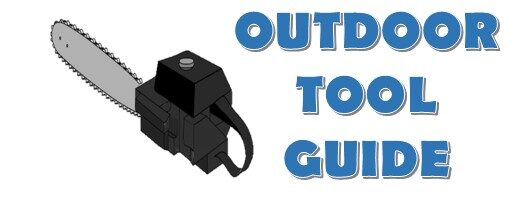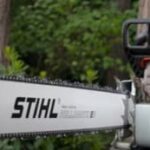As an Amazon Associate, this site earns commissions from qualifying purchases. For more information click here.
Chainsaws are powerful tools that make it easy to cut down even a large tree. But is it enough to rip through metal? You have probably heard some chainsaws being used on metal, and may have also been told by some that it is not a good idea. In this guide, we will explain if it is indeed possible to cut steel and other metals with a chainsaw.
Regular chainsaws can go through thin metal sheets and even nails, but its blades and engine will quickly wear out. You need a professional grade chainsaw with a powerful engine and carbide tipped chain to cut thick, heavy metal.
Regular vs. Professional Chainsaws
There are a lot of different chainsaws available, but when it comes to cutting metal we can divide them between regular and professional. To be specific, you should only use professional or commercial grade chainsaws for metal. An ordinary chainsaw might be able to do it, but you risk damaging the tool or even injury.
So if you have a metal cutting project on hand, compare the differences first between regular and professional grade chainsaws. After this it will be clear why you need a professional or commercial level model.
If you want to get your hands on a metal cutting chainsaw now, there is the NEO-TEC NS8105 105cc chainsaw with a 36 inch blade. With this you should be able to cut through just about anything.
What is a Regular Grade Chainsaw?
A regular or standard grade are those chainsaws sold for home use. They are usually corded electric or cordless (battery). There are also some light chainsaws that run on gas.
These chainsaws are available in a variety of sizes, ranging from 6 to 16 inches. For most homeowners however, a 14-16 inch chainsaw like the Husqvarna 120 with Cycle-X torq is enough. That is sufficient for pruning branches, thick vines and cut down small to medium sized trees.
Regular chainsaws are great for wood cutting, but they can be vulnerable to rust if not cared for. This article shows you different ways to remove rust.
Note that for cutting trees and thick wood, gas chainsaws are preferable to corded and cordless models because they have more power. For pruning and cutting small branches, thin logs and small trees, corded or battery chainsaws will work.
Strictly speaking these chainsaws can probably cut through metal. You have probably hit a few nails while sawing and the blade looked fine.
However, cutting metal with an ordinary chainsaw will dull the blades quickly. In some cases the blade could lose some of its teeth or get chipped. So it is good idea to avoid cutting metals with an ordinary chainsaw.
What is a Professional Grade Chainsaw?
Professional or commercial grade chainsaws are equipped to cut through metal and other hard objects. These have a minimum blade length of 24 inches and run on 45cc or greater. These are also more expensive than regular chainsaws and heavier too.
As you might expect, a professional grade chainsaw is designed for heavy duty and commercial applications. With their carbide tipped blades these saws can cut through thick metal and bamboo without chipping or dulling.
If you need to go through a lot of thick metal, it is worth investing in a commercial grade chainsaw. You will pay more in the beginning, but you can be confident that one, the tool will work, and second, the blades can withstand the pressure without getting damaged.
You can tell the chainsaw is for professional use by its specs and price tag. All of the popular brands carry high level chainsaws so it will not be a problem to find one. If the chainsaw has a 36 inch blade and runs on 50cc for example, you can be sure that it is commercial grade. But to be sure, check the tips if they are carbide or diamond.
What to Look For in a Professional Grade Chainsaw
Reinforced chain. The chain has to have carbide tips or some other type of metal fortification. Some manufacturers might have their own proprietary design. What is important is that the chain is powerful and durable to do this kind of metal cutting. Outdoor Power Deals also makes 18 inch carbide tips for Husqvarna chainsaws and other brands.
Engine power. The larger and thicker the metal, the more powerful the engine has to be. The drawback is that a heavy duty engine consumes a lot of gas and is going to be heavy.
Safety features. Heavy chainsaws can be hard to handle so pick a model that has safety features. This is a must for any tool that will be used for metal works.
Durability. If your project requires you to work with several types of metal, your chainsaw must be durable to handle their different properties.
Is It Safe to Cut Metals with a Chainsaw?
If your chainsaw has a carbide tipped chain and is powerful enough, you can cut metals safely. But you must still exercise caution anytime you use a tool like this. Here are some suggestions:
Some chainsaws are prone to kickback, and this can be dangerous when you are working with metal. Learn how the tool works and how to prevent kickback before attempting to do any cutting.

Professional grade chainsaws are heavy. When running at high power it will vibrate a lot so you must have a firm grip. Working with metals is recommended only for those with experience handling regular chainsaws.
Bits and pieces of metal can fly during the cutting process. Always wear protective face gear before attempting this. Some pieces of metal might generate sparks similar to welding.
You also have to consider the engine capacity in relation to the thickness of the metal you are cutting. If the material is very thick and hard, it might overwhelm the engine and cause failure.
The bottom line is this: if you are going to cut a lot of heavy metal, use a commercial, professional quality chainsaw. Second, make sure the tool is large enough and powerful enough to handle the job. Third, wear the appropriate safety gear before using the tool.
How to Protect Regular Chainsaws from Metals
If you have a standard chainsaw, you need to be careful so that you do not accidentally hit metal and chip the blade. This usually happens with metallic wedges or accidentally hitting metallic objects while cutting wood.
Metal vs. Plastic Felling Wedges. In most cases, plastic felling wedges will do the job. There are a lot of quality plastic felling wedges for chainsaws so you do not really need one made of metal. They are also safer and less expensive. By going with plastic, you minimize the risk of accidental damage.
Because there are plastic materials available, this one is easy to avoid. But the real challenge comes when trying to avoid metals while cutting firewood, or trees. That is what we will cover in the next section.
How to Avoid Metals When Cutting Wood
If you have ever spent time sawing trees, you have probably seen a lot of nails and all sorts of metal objects lodged inside them. As a tree grows, it spreads throughout the area around it and might swallow all kinds of objects lying around.
The first thing you should do is examine the tree you are about to cut. Look closely at the trunk if there are any nails or other objects sticking out. You should also examine the surrounding area. If there are a lot of debris around it, there is a good chance there are some foreign objects stuck in the tree.
Even if the area is free from debris, there is no guarantee that there are no metallic objects lodged in it. Unfortunately, there is no way to tell for sure until you start cutting.
The best way to deal with this is to pay close attention to the sound your chainsaw makes. If it is struggling or there seems to be metal on meta interaction, turn the saw off right away and check the tree. Use a more powerful chainsaw or another tool to cut through the tree and remove the metal object.

I love the outdoors and all the tools for maintaining gardens, yards and lawns. The only thing I am more passionate about is sharing what I know about garden and outdoor equipment.


